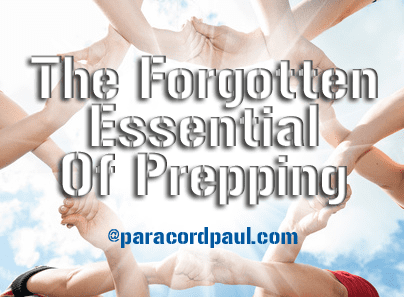The Forgotten Essential Of Prepping

Most preppers have a food storage program, a stockpile of emergency equipment and first aid, and the resources to begin creating their supply of food and essentials for an indefinite period. But, unfortunately, we spend so much time building up these resources that we forget about one of the most important resources we have before us, one that takes little effort and costs no money: community.
Why build community?
Before developing our modern, comfort-filled society, human beings had to survive in harsh conditions–suffering from the many issues that we would encounter if the infrastructure were to collapse this evening. They had to find scarce food, survive harsh elements, and deal with predators.
Because of these harsh conditions, human beings found it most effective to band together into tribes. We often conceive that when the SHTF, our tiny family, will be our only community, we must protect them and only them. Of course, family is the priority, but it is essential to remember that the best way to ensure your and your family’s survival is by banding together into a more prominent tribe as our ancestors did.
Building a resilient community will multiply your resilience exponentially. A community-wide effort expands your resources and contacts and makes big projects and purchases easier to handle. And while all preppers must possess a basic skill set, a community will provide an array of experts in various essential skills (such as gardening or medicine) and secondary skills (like welding).
Building a strong community effort will also ensure safety–what looters would try to take on an extensive community that has a cohesive defense plan? It would be easier to target small families.
What are the downsides, and how do I deal with them?
Some fears often come up when talking about involving the community in our prepping plans. Preppers are sometimes concerned that few people will be convinced to make changes and instead peg them as a “stockpile” if the SHTF.
These are reasonable concerns. Consider, though, that if the SHTF, your neighbors will find out about your stockpile anyways and may take your hiding of this fact as a sign that you are hostile and do not want to work together.
One option is to be clear beforehand that you intend to use your food supply only for your family and that you are capable of protecting it. Another option that may bear better fruits, in the long run, is this: set aside enough food for your neighbors for, say, seventy-two hours.
Tell your neighbors that you have done this in addition to your stockpile and that you would like to work together to build it up to something longer-lasting. This is one massive step to creating a resilient prepping community.
How do I build community?
Not everyone will be interested in prepping, and that’s okay. The key is to identify those who are and build a tight and mutually beneficial relationship with them. If you stop there, though, you lose out on many valuable resources and create the probability of conflict in the future.
Begin community projects (such as a community garden) that don’t require people to be “preppers.”. As you do so, you can mention the importance such projects would play in an SHTF scenario without making that the project’s purpose. Work to build codependency relationships by bartering (people love to feel their skills are valued anyways).
Work to create a more independent and sustainable community and get people on board simply because it will benefit them or because it’s the right thing to do without any mention of prepping. Once you build these kinds of relationships with people, you can choose whether to bring prepping ideas into it as well.
Remember: a strong community of people can learn skills and come together to do what’s necessary when SHTF, but a weak community–even of people who think similarly and have excellent survival plans–will deteriorate and cause harm.
If you’ve been thinking about prepping but haven’t made your move yet, get started today by downloading my Paracord Tips eBook.
